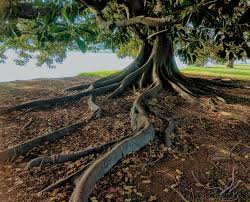De-centering the Human: A Close Reading of Nonhuman Agency in Elif Shafak’s The Island of Missing Trees
الكلمات المفتاحية:
Nonhuman Agency، Post humanism، Elif Shafak، The Island of Missing Trees، Interconnectedness، Material Eco criticismالملخص
This research explores how Elif Shafak’s The Island of Missing Trees (2021) challenges human-centered perspectives by giving narrative consciousness to a fig tree. The study investigates how Shafak redefines storytelling through a dialogue between human and nonhuman life that turns the novel into a reflection on coexistence, empathy, and ecological awareness. The research examines how the novel builds meaning through the vitality of matter and the agency of the nonhuman world by deploying Rosi Braidotti’s post human philosophy and Serpil Oppermann’s framework of material Eco criticism. The fig tree is not a passive symbol but a conscious voice that remembers, feels, and communicates. Through close reading, the research uncovers how the text connects human trauma with environmental memory and shows that healing begins with recognizing the interdependence among all forms of life. The analysis reveals that empathy is presented as a shared ecological capacity that extends beyond human boundaries and becomes a foundation for ethical coexistence. This study contributes to post human and environmental literary discussions by showing how fiction can express new forms of consciousness and responsibility. The novel invites readers to imagine coexistence built on care, reciprocity, and respect for the entire living world.
التنزيلات
المراجع
1. Belsey, C. (2005). Textual analysis as a research method. In G. Griffin (Ed.), Research methods for English studies (pp. 157–174). Edinburgh University Press.
2. Bolter, J. D. (1991). Writing space: The computer, hypertext, and the history of writing. Lawrence Erlbaum Associates.
3. Braidotti, R. (2013). The posthuman. Polity Press.
4. Commoner, B. (1974). The closing circle: Nature, man, and technology. Knopf.
5. Glotfelty, C., & Fromm, H. (Eds.). (1996). The ecocriticism reader: Landmarks in literary ecology. University of Georgia Press.
6. Haraway, D. (2003). The companion species manifesto: Dogs, people, and significant otherness. Prickly Paradigm Press.
7. Iovino, S., & Oppermann, S. (Eds.). (2014). Material ecocriticism. Indiana University Press.
8. Oppermann, S. (2016). From posthumanism to posthuman ecocriticism. In S. Oppermann & S. Iovino (Eds.), Environmental humanities: Voices from the Anthropocene (pp. 21–36). Rowman & Littlefield.
9. Shafak, E. (2021). The island of missing trees. Viking Press.

التنزيلات
منشور
إصدار
القسم
الرخصة
الحقوق الفكرية (c) 2025 Scholar Insight Journal

هذا العمل مرخص بموجب Creative Commons Attribution 4.0 International License.
Authors retain the copyright of their work. All articles in Scholar Insight Journal are published under the terms of the Creative Commons Attribution 4.0 International License (CC BY 4.0).
This license permits anyone to read, download, copy, distribute, print, search, or link to the full texts of the articles, and to use them for any other lawful purpose, without asking prior permission from the author(s) or the publisher, provided proper attribution is given to the original work.




